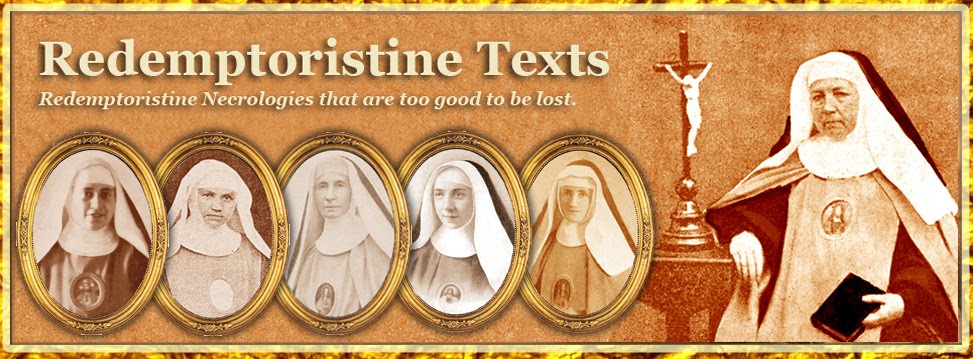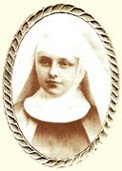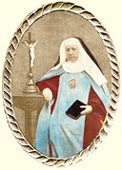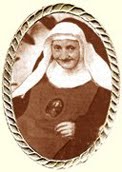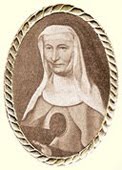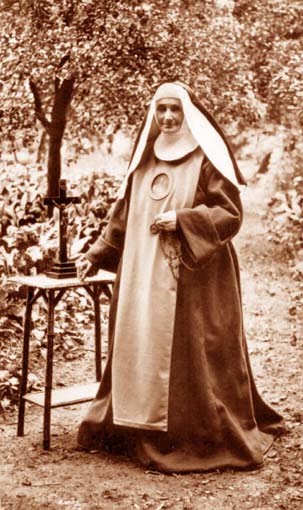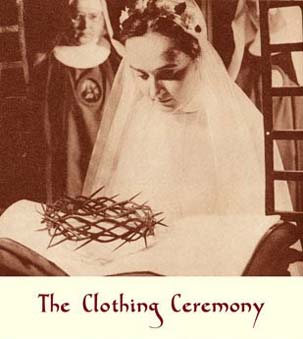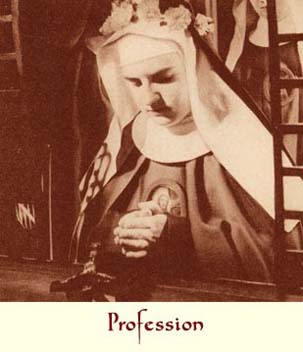Miss Flavie-Catherine Pétronille Rovoys was born at Antwerp on 27th March of profoundly Christian parents. She entered the convent on 24th September 1865, received the habit of the order on 10th October 1866 and made her profession on 13th November 1867.
“Our Sister,” says the Monastery Chronicle, “used her early youth to help her mother. Two of her younger Sisters had already preceded her into religion and when her mother fell sick, she took care of the business until she died. She practiced beautiful acts of charity in regard to the country people who came to her for provisions. Deeply understanding the duties of filial love, she procured the last help and supreme consolations of the church for her mother, and thanks to her devotion, one of her uncles was equally provided with these supreme passports to eternity.
“In the course of her novitiate, Sister Marie-Clementine obtained through a novena to the Venerable Father Passerat, the cure of pains in her knee that could have prevented her from being admitted to profession. [1] Her aptitudes for cutting and sewing led to her being named robe-maker, a task that she fulfilled with zeal and a great spirit of poverty. In her last years, she helped again as best she could, in spite of her infirmities. She was quite original, and her rejoinders in recreation, sometimes provoked general hilarity. Two months before her death, feeling her strength declining, she asked not to be named again in the distribution of tasks; however, until her last days, she was always seen in Holy Mass and Holy Communion.
“One the day of the immaculate Conception, 8th December 1903, she asked of her own accord for the last sacraments. They were administered to her in the afternoon by the community confessor. In the evening, seeing that Extreme-Unction had only fortified her spiritually, she said: “Everything is accomplished, now I can die.” But God only came to take her the following morning. Shortly after the community Mass, the Sister infirmarian, noticing the change in her features, warned the Sisters, who assembled beside her bed to help her with their prayers. The chaplain made the recommendation of her soul: some moments afterwards, at about 8:30, and with no agony, our good Sister fell asleep peacefully in the Lord.
“Our Sister,” says the Monastery Chronicle, “used her early youth to help her mother. Two of her younger Sisters had already preceded her into religion and when her mother fell sick, she took care of the business until she died. She practiced beautiful acts of charity in regard to the country people who came to her for provisions. Deeply understanding the duties of filial love, she procured the last help and supreme consolations of the church for her mother, and thanks to her devotion, one of her uncles was equally provided with these supreme passports to eternity.
“In the course of her novitiate, Sister Marie-Clementine obtained through a novena to the Venerable Father Passerat, the cure of pains in her knee that could have prevented her from being admitted to profession. [1] Her aptitudes for cutting and sewing led to her being named robe-maker, a task that she fulfilled with zeal and a great spirit of poverty. In her last years, she helped again as best she could, in spite of her infirmities. She was quite original, and her rejoinders in recreation, sometimes provoked general hilarity. Two months before her death, feeling her strength declining, she asked not to be named again in the distribution of tasks; however, until her last days, she was always seen in Holy Mass and Holy Communion.
“One the day of the immaculate Conception, 8th December 1903, she asked of her own accord for the last sacraments. They were administered to her in the afternoon by the community confessor. In the evening, seeing that Extreme-Unction had only fortified her spiritually, she said: “Everything is accomplished, now I can die.” But God only came to take her the following morning. Shortly after the community Mass, the Sister infirmarian, noticing the change in her features, warned the Sisters, who assembled beside her bed to help her with their prayers. The chaplain made the recommendation of her soul: some moments afterwards, at about 8:30, and with no agony, our good Sister fell asleep peacefully in the Lord.
Footnotes
[1] It is not the only cure that the Redemptoristines obtained by the intercession of the Ven. Father Passerat. From 1858, and only a few days after the death of the venerable Patriarch, there took place in Bruges a very astonishing cure. We borrow the account of it from the opuscule called: God's great servant, the Most Rev. Father Joseph Passerat, of the Community of the Most Holy Redeemer. – A biographic note, by Father Girouille, of the same Community. Montreuil-sur-mer, Notre-Dame-des-prés press.
In the monastery of the Redemptoristines of Bruges, there was a young postulant, Annette Berwaerts, later Sister Marie-Cécile of the Child Jesus, who was seized by an illness that began to inspire serious concerns. “It was,” the chronicles of the convent say, “A sort of erysipelas with blisters that covered both her legs.” The wounds discharged an abundant suppuration and appeared so inflamed that the physician feared gangrene. On 31st October the monastery learned of the great news of the vigil (the death of the Rev. Father Passerat). Immediately the poor patient and her infirmarian felt the inspiration to offer a novena for the holy religious. But their confidence was too lively and too eager to wait nine days for the intervention they so much desired. They decided to recite nine times, on the same day, on different occasions, five Paternosters, five Ave Marias, and five Gloria Patris.
Through a sentiment of filial piety as charming as it was naive, they had to add a De Profundis, in case that the dear departed still had need of it. It was under this expeditious form that the novena began and finished on 31st October. The two nuns added this urgent invocation to their prayers: “Father Passerat, if you are in heaven, you must obtain this grace for us.” The following morning, when the infirmarian went to examine the wounds, a cry of joy escaped her lips. There was no more trace of the malign humour that, even that evening, was flowing like a spring. Her flesh was as clean as before her illness, and her recovery was beyond doubt and complete.
Two days after this event, Father Passerat’s funeral ceremony took place.)
In the monastery of the Redemptoristines of Bruges, there was a young postulant, Annette Berwaerts, later Sister Marie-Cécile of the Child Jesus, who was seized by an illness that began to inspire serious concerns. “It was,” the chronicles of the convent say, “A sort of erysipelas with blisters that covered both her legs.” The wounds discharged an abundant suppuration and appeared so inflamed that the physician feared gangrene. On 31st October the monastery learned of the great news of the vigil (the death of the Rev. Father Passerat). Immediately the poor patient and her infirmarian felt the inspiration to offer a novena for the holy religious. But their confidence was too lively and too eager to wait nine days for the intervention they so much desired. They decided to recite nine times, on the same day, on different occasions, five Paternosters, five Ave Marias, and five Gloria Patris.
Through a sentiment of filial piety as charming as it was naive, they had to add a De Profundis, in case that the dear departed still had need of it. It was under this expeditious form that the novena began and finished on 31st October. The two nuns added this urgent invocation to their prayers: “Father Passerat, if you are in heaven, you must obtain this grace for us.” The following morning, when the infirmarian went to examine the wounds, a cry of joy escaped her lips. There was no more trace of the malign humour that, even that evening, was flowing like a spring. Her flesh was as clean as before her illness, and her recovery was beyond doubt and complete.
Two days after this event, Father Passerat’s funeral ceremony took place.)
This necrology is translated from Fleurs de l'Institut des Rédemptoristines by Mr John R. Bradbury. The copyright of this translation is the property of the Redemptoristine Nuns of Maitland, Australia. The integral version of the translated book will be posted here as the necrologies appear.
